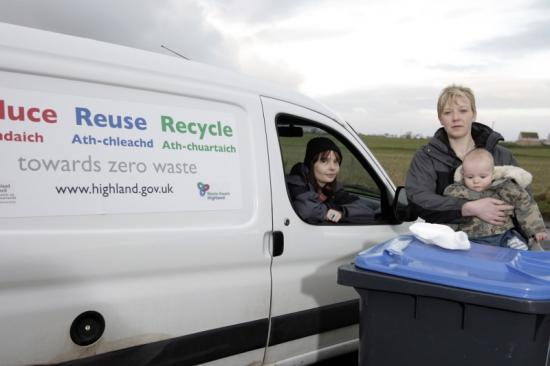Good Start For Rural Kerbside Recycling Collections In Caithness
21st December 2008

Over 10 tonnes of waste has been diverted from landfill in the first week of the rural recycling collections in Caithness with 60% of residents putting out their bins for collection.
Chairman of TEC Services, Councillor John Laing said: "I would like to thank the public for their high level of commitment to making the new service such a success. Already in the first week over 10 tons of material has been diverted from landfill and will instead be used to make products, thus saving both resources and energy used in converting them. This is all good news for the environment."
Encouragingly, contamination of the bins with the wrong material has been low with glass being the main culprit followed by plastic bags, Tetrapak and plastic other than bottles.
Householders are reminded that collections are only once every four weeks so it is important to check the dates on their calendars to ensure that they do not miss their collection day. They are also reminded that the bins cannot take glass and they should continue to use their local recycling points for this. Tetrapak must also not be put in blue-lidded bin but may be saved up and taken to the Thurso Recycling Centre where a special bin is provided.
All items in the bins should be loose with no plastic bags or any other plastic other than the plastic bottles. Full details of how to use the bins are given in the booklet that was delivered with the bins.
Any resident needing further advice can contact the Council by telephoning on 01955 607171 or visit www.highland.gov.uk/recycle or email - recycle[AT]highland.gov.uk.
PHOTO
The Highland Council's Waste Management Assistant for Caithness, Andrea Wotherspoon is pictured with Kirsty Miller and baby Glen from Tales of Watten as they wait for their blue bin to be emptied by the recycling crew.
Related Businesses
Related Articles
Council welcomes Visitor Levy flexibility plan
The Highland Council welcomes moves by the Scottish Government to introduce greater flexibility on how it could design a Visitor Levy Scheme for consultation. The Visitor Levy (Scotland) Act 2024 currently provides local authorities with discretionary powers to implement percentage-based levies following statutory consultation.Highland Council is reaching out for views to shape its next 26/27 budget.
As it looks to set out its forthcoming priorities, the council is seeking involvement from members of the public, including businesses, community groups, parents, and young people. All their opinions are going to be crucial in deciding how Highland Council will take on its budget challenge for 2026-2027.Have your say in Thurso's future £100million investment by attending public consultation events
Thurso is to benefit from £100m investment in education and community facilities and are rolling out the first phase of public consultations on 9 and 10 December 2025. The Highland Council is inviting people that live, work, or study in Thurso, to come along to the public consultation events to have their say; this is an opportunity to help shape the future of Thurso, to gather views and ideas.Finding new owners for empty homes - Scheme launched to help return more empty homes to active use
A new online portal has been launched to bring empty homeowners together with prospective buyers or developers with the aim of facilitating more properties to be used as homes again. Covering the whole of Scotland, this builds on the success of local pilots, referred to as "matchmaker schemes".Consideration for short term let control area in Skye and Raasay
Steps towards introducing a short term let control area have been considered by Highland Council's Isle of Skye and Raasay area committee. On Monday (1 December 2025) the committee heard evidence to justify the grounds for the introduction of a Short Term Let Control Area covering all or part of Skye and Raasay.Workforce North event spotlights Highland economy
EMPLOYERS and educators from across the Highlands have gathered to hear how a new initiative is aiming to transform the region's economy. Workforce North - A Call to Action brought together business leaders and teachers from primary and secondary schools from across the Highland Council area with a wide range of partners geared towards education, learning and skills development at Strathpeffer Pavillion.
Council calls for meaningful engagement from Home Office Over 300 Asylum Seekers Being Sent to Inverness
The Highland Council continues to call for meaningful engagement from the Home Office over its plans to temporarily accommodate up to 300 adult male asylum seekers at Cameron Barracks, Inverness. It follows an email on Monday from Alex Norris MP, Minister for Border Security and Asylum, to Council Leader, Raymond Bremner, which failed to answer questions raised by the Council or address community concerns.SSEN Transmission becomes first signatory to Highland Social Value Charter
SSEN Transmission has become the first company to sign up to the Highland Social Value Charter (HSVC), marking a significant milestone in delivering long-term socio-economic benefits for communities across the Highlands. Investment commitments from the company include funding for roads, new homes, jobs, and work for local contractors in addition to a local and regional fund for communities to apply to.Wick - Aberdeen PSO - Update issued 24/11/2025
The Highland Council continues to work through the procurement process for the provision of the Wick Public Service Obligation for the Highland Council. We have now entered the preferred bidder stage and have entered a standstill period.Highland Council winter road condition and school closure report for 25 November 2025
Maps of the Council's gritting routes by priority and policy are available online at www.highland.gov.uk/gritting (external link) The information provided is a summary of reports from operational staff and is intended to give a general indication of typical conditions in each area at a point in time. It is not intended to imply that any individual route is entirely snow and ice free and drivers must be aware that conditions can change rapidly and make their own assessment of conditions for travelling.
